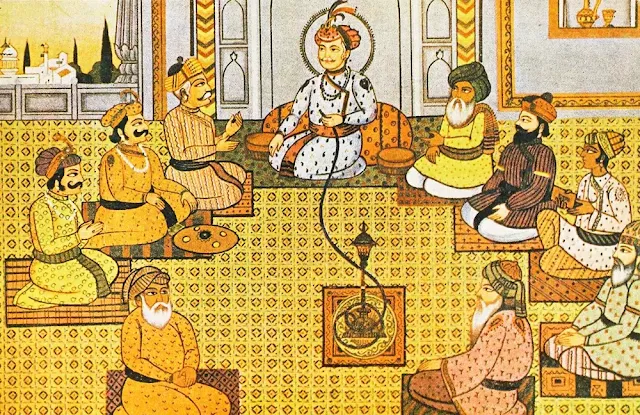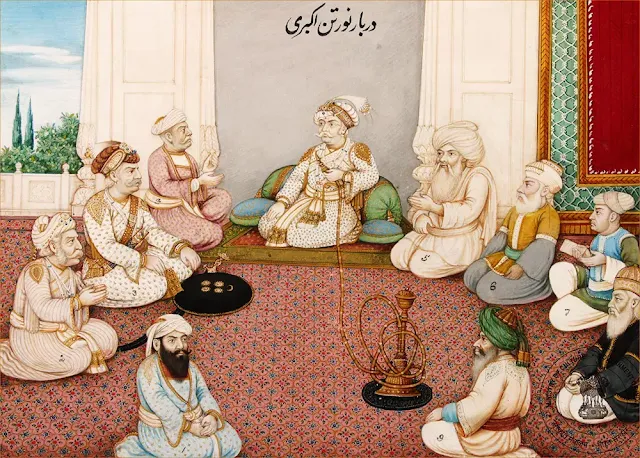The Legend of Akbar's Navratnas
It is commonly believed that Mughal emperor Akbar (r: 1556-1605) had a group of nine extraordinary men in his court, known as Nine Jewels (Gems) or Navratnas. These men were said to be Abul Fazl, his brother Faizi, Miyan Tansen, Raja Birbal, Raja Todar Mal, Raja Man Singh, Abdul Rahim Khan-i-Khanan, Fakir Aziao-Din and Mulla Do-Piyaza. Vincent Smith's book 'Akbar the Great Mogul' replaces Fakir Aziao-Din with Hakim Humam. Some websites have Raja Bhagwan Das or Mirza Aziz Koka in place of Fakir Aziao-Din. The question remains: did Akbar indeed have 'Navratnas' in his court?
Interestingly, there is no mention of 'navratnas' in any contemporary history books including Ain-i-Akbari, Tarikh-i Ferishta, Akbarnama, Muntakhab-ut-Tawarikh or Tabakati Akbari. Historians such as R. Nath, Raj Kishore Raje, and M. K. Pundhir concur that the concept of Akbar's 'navratnas' is purely based on folklore.
The concept of navratnas is traditionally associated with king Vikramaditya. Rao Bahadur G. S. Sardesai believe that the term navratnas in reference to Akbar was a creation of popular fancy, started after his death, possibly by Hindu pandits of the courts of Shah Jahan and Dara Shukoh.
Interestingly, there is no mention of 'navratnas' in any contemporary history books including Ain-i-Akbari, Tarikh-i Ferishta, Akbarnama, Muntakhab-ut-Tawarikh or Tabakati Akbari. Historians such as R. Nath, Raj Kishore Raje, and M. K. Pundhir concur that the concept of Akbar's 'navratnas' is purely based on folklore.
The concept of navratnas is traditionally associated with king Vikramaditya. Rao Bahadur G. S. Sardesai believe that the term navratnas in reference to Akbar was a creation of popular fancy, started after his death, possibly by Hindu pandits of the courts of Shah Jahan and Dara Shukoh.
Presented below are six miniatures depicting Akbar's reputed navratnas:
Emperor Akbar's court was known for its many scholars and talented artists. It is said that Akbar "sees through some men at the first glance and confers upon them high rank."
We will now provide a brief biography of each of the so-called navratnas, although it should be noted that Fakir Aziao-Din and Mulla Do-Piyaza are fictional characters.
In 1602, Abul Fazl was assassinated on the orders of Jahangir. Akbar mourned deeply for his loss, expressing regret, "If Salim wished to be emperor, he might have killed me and spared Abul Fazl."
Abul Fazl completed the Ain-i-Akbari in the 42nd year of Akbar's reign. He also wrote, the Akbarnama, detailing Akbar's reign up to the 46th year, till 1602, which was then completed by Inayatullah. Abul Fazl was a follower of Akbar's Divine Faith (also known as Dīn-i Ilāhī or Tawḥīd-i-Ilāhi).
Tansen's music captivated Akbar and the entire court. Upon Tansen's death in 1589, Akbar ordered that all musicians and singers should accompany his body to the grave, making melodies as at a marriage. He lamented that Tansen's death was the annihilation of melody.
Akbar conferred on him the title of Kavi Rai or Poet Laureate. In 1573, Akbar honoured him with the title of Raja Birbal, meaning the Brave Raja. Birbal was also a follower of Akbar's Divine Faith. Badauni believed that Birbal was primarily responsible for Akbar's apostasy from Islam.
Birbal met his death during a battle with the Yusufzai Afghans in 1586, and his body was never found. In his sorrow, Akbar lamented, "Alas, that they could not bring his body out of that defile, that it might have been committed to the flames!" Akbar-Birbal folk tales are very famous.
Todar Mal died in 1589 at Lahore. Abul Fazl records, "He was the unique of the age for uprightness, straightforwardness, courage, knowledge of affairs and the administration of India."
After returning from Todar Mal's cremation, Bhagwan Das suffered an attack of Strangury, from which he died in 1589. He built a Jami Masjid at Lahore.
At the time of Akbar's death, Man Singh plotted with Mirza Aziz Koka to support Prince Khusrau, Jahangir's eldest son, for the throne, but this plan ultimately failed.
The ground on which the Taj Mahal stands at Agra belonged to him.
After the death of Bairam Khan, Akbar took young Rahim, who was just four years old, under his care. Akbar bestowed upon him the title of Khan Khanan after his victory over Muzaffar Shah III of Gujarat. In 1590, Rahim translated Babur's Memoirs from Turki to Persian.
Although Akbar was often offended by Aziz's boldness, he rarely punished him, stating, "Between me and Aziz is a river of milk which I cannot cross." In the 23rd year of Akbar's reign, he honoured him with the title of Azam Khan. Aziz Koka was also a member of Akbar's Divine Faith.
Prince Khusrau married one of Aziz's daughters. After Akbar's death, Mirza Aziz Koka conspired with Man Singh in a failed attempt to crown Khusrau as the new ruler.
We will now provide a brief biography of each of the so-called navratnas, although it should be noted that Fakir Aziao-Din and Mulla Do-Piyaza are fictional characters.
Shaikh Abul Fazl Allami
Abul Fazl, a renowned historian as well as Akbar's prime minister, was a commander of 2500. In 1575, he presented himself before Akbar. Abul Fazl records, "As I had no worldly treasures to lay at the feet of his Majesty, I wrote a commentary to the Ayat ul-Kursi, and presented it to him. I was favourably received, and his Majesty graciously accepted my offering."In 1602, Abul Fazl was assassinated on the orders of Jahangir. Akbar mourned deeply for his loss, expressing regret, "If Salim wished to be emperor, he might have killed me and spared Abul Fazl."
Abul Fazl completed the Ain-i-Akbari in the 42nd year of Akbar's reign. He also wrote, the Akbarnama, detailing Akbar's reign up to the 46th year, till 1602, which was then completed by Inayatullah. Abul Fazl was a follower of Akbar's Divine Faith (also known as Dīn-i Ilāhī or Tawḥīd-i-Ilāhi).
Shaikh Abul Faiz or Faizi
Shaikh Faizi, the elder brother of Abul Fazl, was also a member of Akbar's Divine Faith. In 1594-95, Faizi completed the poem of Nal Daman (Nala Damayanti). Akbar conferred upon him the title of Maliku-sh-shuara (King of the Poets). Faizi suffered from Asthma and died in 1595.Miyan Tansen
Tansen was a renowned musician in the court of Raja Ram Chand Baghelah. When his fame reached Akbar, he sent an officer to bring Tansen to his court.Tansen's music captivated Akbar and the entire court. Upon Tansen's death in 1589, Akbar ordered that all musicians and singers should accompany his body to the grave, making melodies as at a marriage. He lamented that Tansen's death was the annihilation of melody.
Raja Birbal
Born as Mahesh Das, Raja Birbal was a renowned Hindi bard and a commander of 2000. Badauni noted that at the beginning of Akbar's reign, Gadai Brahmaindas, a skilled Brahman musician, whose main job was to praise the Hindus, came to the court. Taking advantage Akbar's idiosyncrasies, he gradually won his favor and eventually became so intimate with him that it became 'thy flesh is my flesh, and thy blood my blood'.Akbar conferred on him the title of Kavi Rai or Poet Laureate. In 1573, Akbar honoured him with the title of Raja Birbal, meaning the Brave Raja. Birbal was also a follower of Akbar's Divine Faith. Badauni believed that Birbal was primarily responsible for Akbar's apostasy from Islam.
Birbal met his death during a battle with the Yusufzai Afghans in 1586, and his body was never found. In his sorrow, Akbar lamented, "Alas, that they could not bring his body out of that defile, that it might have been committed to the flames!" Akbar-Birbal folk tales are very famous.
Raja Todar Mal
Raja Todar Mal is best known as Akbar's Finance Minister. He introduced many financial reforms, insisting that all government accounts be written in Persian (previously they were kept in Hindi).Todar Mal died in 1589 at Lahore. Abul Fazl records, "He was the unique of the age for uprightness, straightforwardness, courage, knowledge of affairs and the administration of India."
Raja Bhagwan Das
Raja Bhagwan Das was the son of Raja Bharmal, the first Rajput ruler, who entered the service of Akbar. His sister was Hira Kunwari, Akbar's first Hindu wife. His daughter, Manbhawati Bai married Jahangir, and his grandson was Prince Khusrau. He was given the title of Amir ul Umara.After returning from Todar Mal's cremation, Bhagwan Das suffered an attack of Strangury, from which he died in 1589. He built a Jami Masjid at Lahore.
Raja Man Singh
Raja Man Singh, the son of Raja Bhagwan Das, was appointed by Akbar to fight against Maharana Pratap. After the death of Bhagwan Das, Akbar bestowed upon him the title of Raja.At the time of Akbar's death, Man Singh plotted with Mirza Aziz Koka to support Prince Khusrau, Jahangir's eldest son, for the throne, but this plan ultimately failed.
The ground on which the Taj Mahal stands at Agra belonged to him.
Mirza Abdu-r-Rahim Khan Khanan
Mirza Abdu-r-Rahim Khan Khanan was the son of Bairam Khan, Akbar's regent. His mother was Bairam Khan's first wife, the daughter of Jamal Khan of Mewat. Following Bairam Khan's death, Akbar married his widow Salima Sultan Begum, making Abdu-r-Rahim his step-son.After the death of Bairam Khan, Akbar took young Rahim, who was just four years old, under his care. Akbar bestowed upon him the title of Khan Khanan after his victory over Muzaffar Shah III of Gujarat. In 1590, Rahim translated Babur's Memoirs from Turki to Persian.
Khan-i-Azam Mirza Aziz Koka
Mirza Aziz Koka was the foster brother of Akbar. His father, Atgah Khan was a soldier who helped Humayun to cross the river after his defeat at the battle of Kannauj by Sher Shah Suri. Humayun appointed Atgah's wife, Jiji Anaga, as Akbar's wet nurse at Umerkot.Although Akbar was often offended by Aziz's boldness, he rarely punished him, stating, "Between me and Aziz is a river of milk which I cannot cross." In the 23rd year of Akbar's reign, he honoured him with the title of Azam Khan. Aziz Koka was also a member of Akbar's Divine Faith.
Prince Khusrau married one of Aziz's daughters. After Akbar's death, Mirza Aziz Koka conspired with Man Singh in a failed attempt to crown Khusrau as the new ruler.







Excellent
ReplyDelete